Samsung SSD 840 Pro (256GB) Review
by Anand Lal Shimpi on September 24, 2012 7:00 AM EST- Posted in
- Storage
- SSDs
- Samsung
- Samsung SSD 840
Random Read/Write Speed
The four corners of SSD performance are as follows: random read, random write, sequential read and sequential write speed. Random accesses are generally small in size, while sequential accesses tend to be larger and thus we have the four Iometer tests we use in all of our reviews.
Our first test writes 4KB in a completely random pattern over an 8GB space of the drive to simulate the sort of random access that you'd see on an OS drive (even this is more stressful than a normal desktop user would see). I perform three concurrent IOs and run the test for 3 minutes. The results reported are in average MB/s over the entire time. We use both standard pseudo randomly generated data for each write as well as fully random data to show you both the maximum and minimum performance offered by SandForce based drives in these tests. The average performance of SF drives will likely be somewhere in between the two values for each drive you see in the graphs. For an understanding of why this matters, read our original SandForce article.
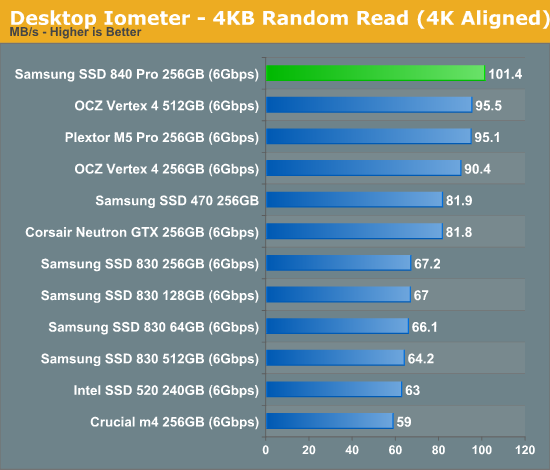
We have a new king, the 840 Pro manages to inch past the fastest Vertex 4 in our random read performance test.
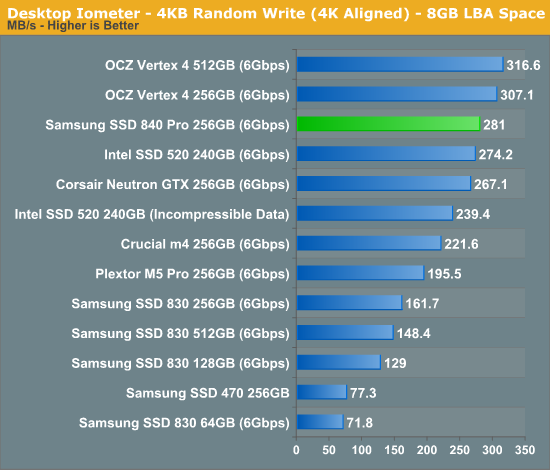
The low queue depth random write performance crown goes back to the Vertex 4, but the 840 Pro is around 75% faster than the old 830. Other than the Vertex 4, there's nothing faster than the 840 Pro here.
Many of you have asked for random write performance at higher queue depths. What I have below is our 4KB random write test performed at a queue depth of 32 instead of 3. While the vast majority of desktop usage models experience queue depths of 0 - 5, higher depths are possible in heavy I/O (and multi-user) workloads:
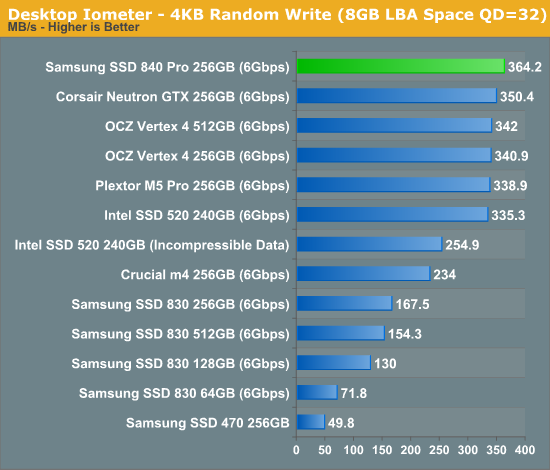
Ramp up queue depth and the 840 Pro manages to even outperform Corsair's new Neutron GTX.
Sequential Read/Write Speed
To measure sequential performance I ran a 1 minute long 128KB sequential test over the entire span of the drive at a queue depth of 1. The results reported are in average MB/s over the entire test length.
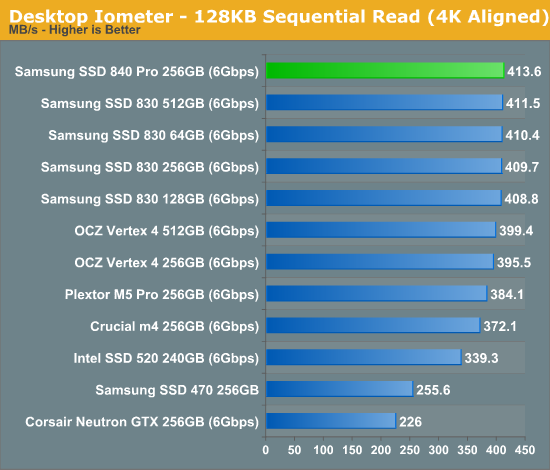
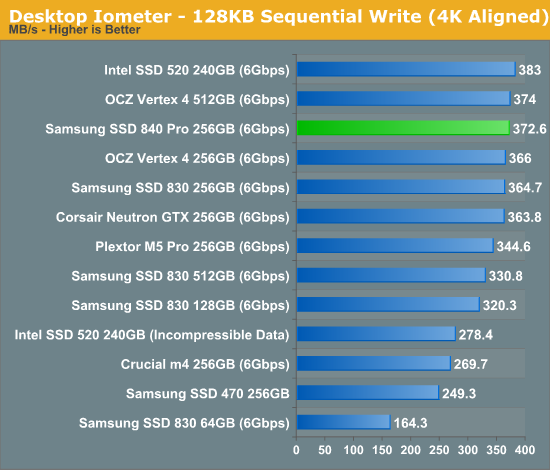
There are no tradeoffs here: excellent random IO performance and class leading low queue depth sequential performance. The 840 Pro is looking like a good all-around performer.
AS-SSD Incompressible Sequential Performance
The AS-SSD sequential benchmark uses incompressible data for all of its transfers. The result is a pretty big reduction in sequential write speed on SandForce based controllers.
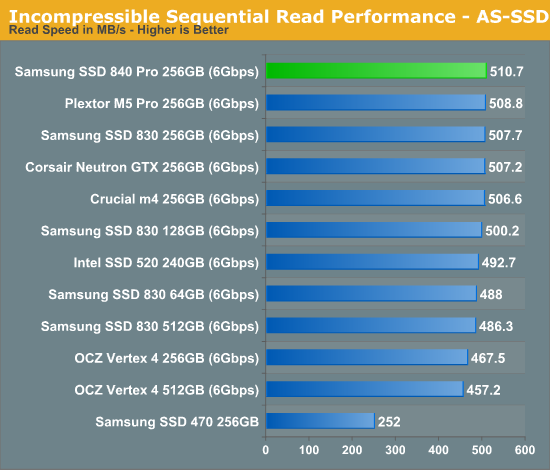
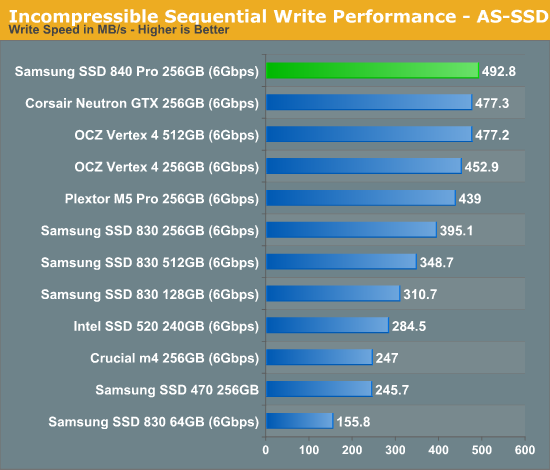
The 840 Pro lands on top once again in these higher queue depth sequential tests. The competition is hot on the heels of the 840 Pro however, we're limited by 6Gbps SATA here so expect continued clustering around 500MB/s going forward.










96 Comments
View All Comments
KPOM - Monday, September 24, 2012 - link
This looks like a nice SSD from Samsung offering top tier performance combined with low power consumption.nathanddrews - Monday, September 24, 2012 - link
Agreed. I love my Samsung 830 drives, so at least now I know where to go when I upgrade!Old_Fogie_Late_Bloomer - Monday, September 24, 2012 - link
I came THIS close to buying an 830 yesterday for my laptop. I even did a search for "Samsung 840" to see if there was any news of a successor, to no avail. Still, something stopped me from doing it, and it looks like my procrastination paid off...HisDivineOrder - Monday, September 24, 2012 - link
Exact same thing happened to me. Think the sales were just a little too good lately. Made me suspicious.Old_Fogie_Late_Bloomer - Monday, September 24, 2012 - link
Ha ha, come to think of it, I know exactly what you mean. And not that the 256GB 830 isn't a good deal at $200, but I think the improvements in the 840 Pro will be worth it.I wish I could justify the cost of a 500/512GB drive, but I can always throw my laptop's original HD in a hard drive caddy if I need more storage.
Grok42 - Monday, September 24, 2012 - link
Same here. I kept seeing the 830 show up in sales but couldn't find any rumors about a next generation drive. I've been putting off my new build for a while now. Prior to waiting on the 840 I waited for the next Nvidia release which ended up being the 660TI. I get everyone worry about a new SSD drive but by the time I actually pull the trigger on everything it will have been out a month and I'll know by then.TrackSmart - Monday, September 24, 2012 - link
If you can get the 830 at a massive discount, why not go for it? A couple of thoughts:1) I would never put a new-to-market SSD in on of my machines. It's not worth the risk. Check back in 6 months, or a year, and see how they have held up.
2) There's no discernible difference in performance among any of the top-tier SSDs under normal workloads. Anand and company make these drives jump through flaming hoops (i.e. their Bench suite) before they see differences between the drives under normal workloads.
I'd rather buy something that is fast, proven reliable, and at a good price. I'll let others be the crash test dummies for new SSDs.
Old_Fogie_Late_Bloomer - Monday, September 24, 2012 - link
Yeah, I thought about that, too. Why not go for a cheaper, proven drive that's nearly as fast? On the other hand, I bought a 320 based on its reputation for reliability, and a month later, bam, 8MB power bug, so you really never know.In my case, my laptop is not a mission-critical device; I have a desktop, as well as access to other laptops in the house, so if it suddenly needs service, it's not the end of the world. It's on me to do regular backups, and the 840 Pro has a FIVE YEAR warranty. So I think maybe I will be the crash test dummy this time, for the heck of it. Worst case scenario, I can always just toss the original hard drive back in there.
peterfares - Monday, September 24, 2012 - link
The thing is, you're not going to ever notice the difference between the 830 and the 840, or even the Crucial M4. I've seen the 256GB Crucial M4 for as low as $140 in the past couple weeks. That is a much better purchase than the 840 if the 256GB 840 is any more then $180 or so.Old_Fogie_Late_Bloomer - Monday, September 24, 2012 - link
Back when I got my Intel 320 SSD, I bought it because of Intel's reputation for reliability. Then they went with Sandforce controllers and I just don't trust them anymore. Meanwhile, Samsung also developed a reputation for reliability, and I'm inclined (perhaps unfairly) to trust them over other manufacturers.I'll be curious to see what Samsung and Anand have to say about the failure of the unit used for this review. I could still see going for the 830 if there's an indication that reliability HAS been compromised in some way.